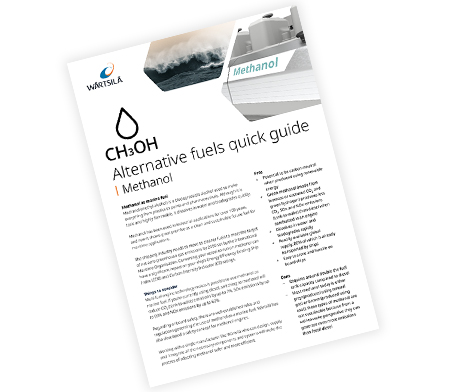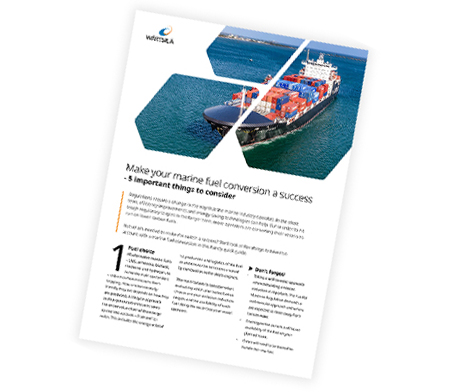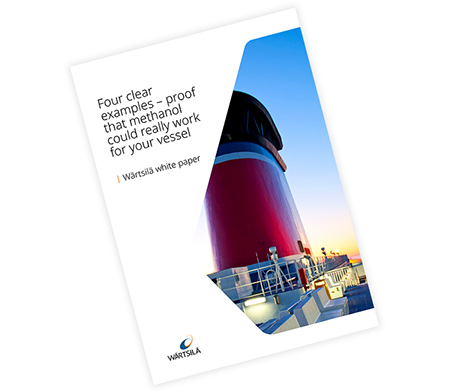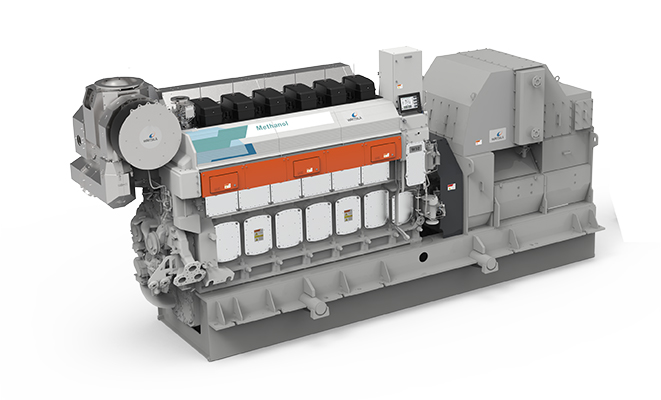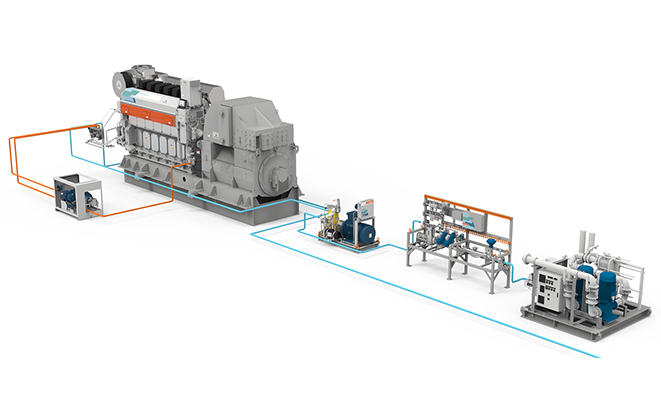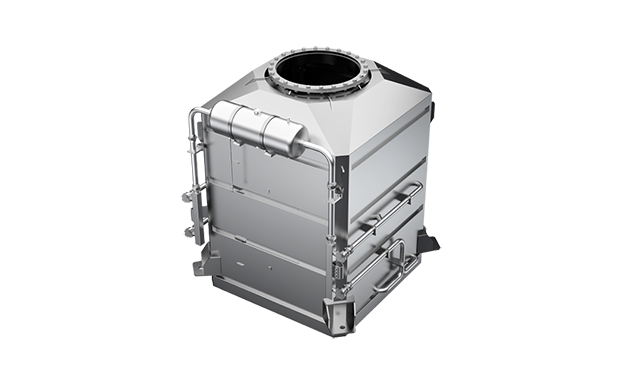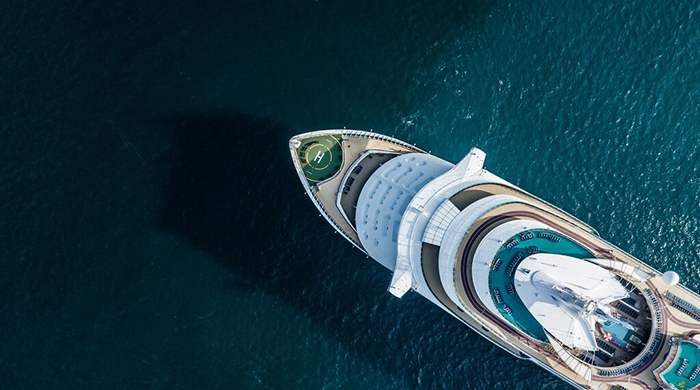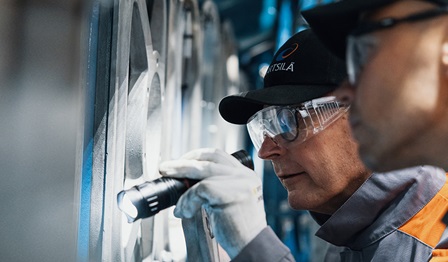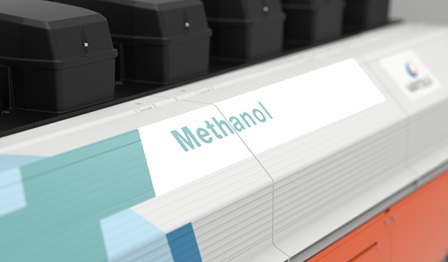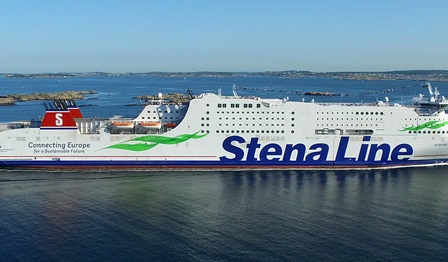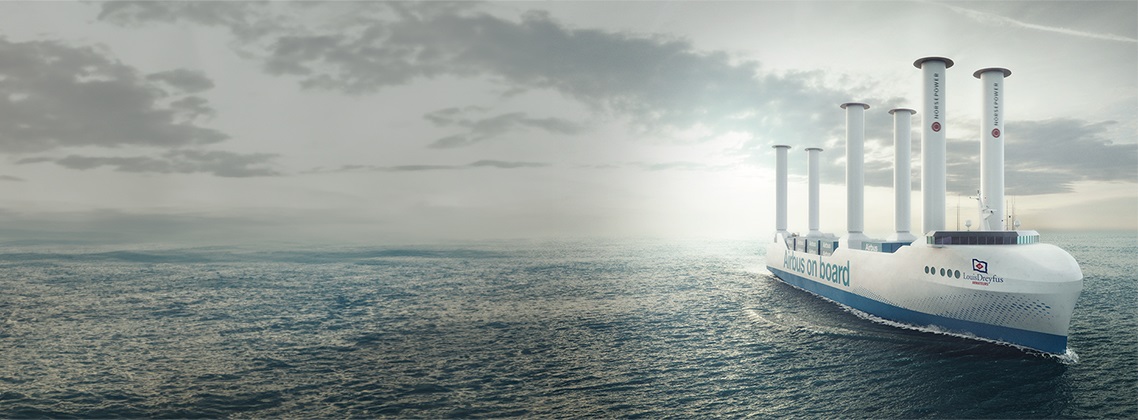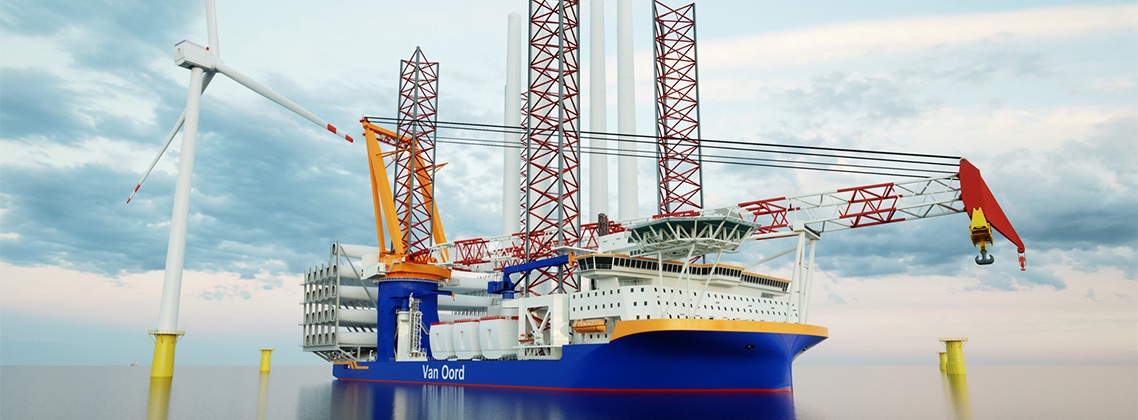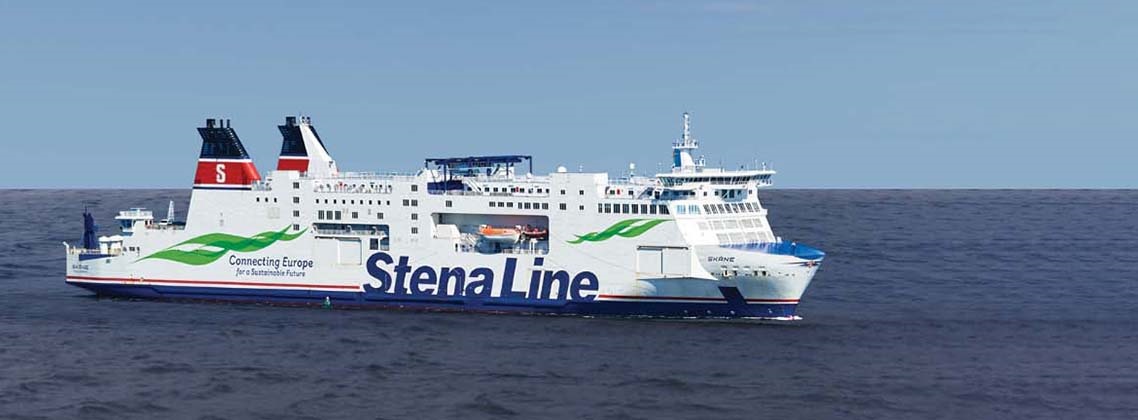
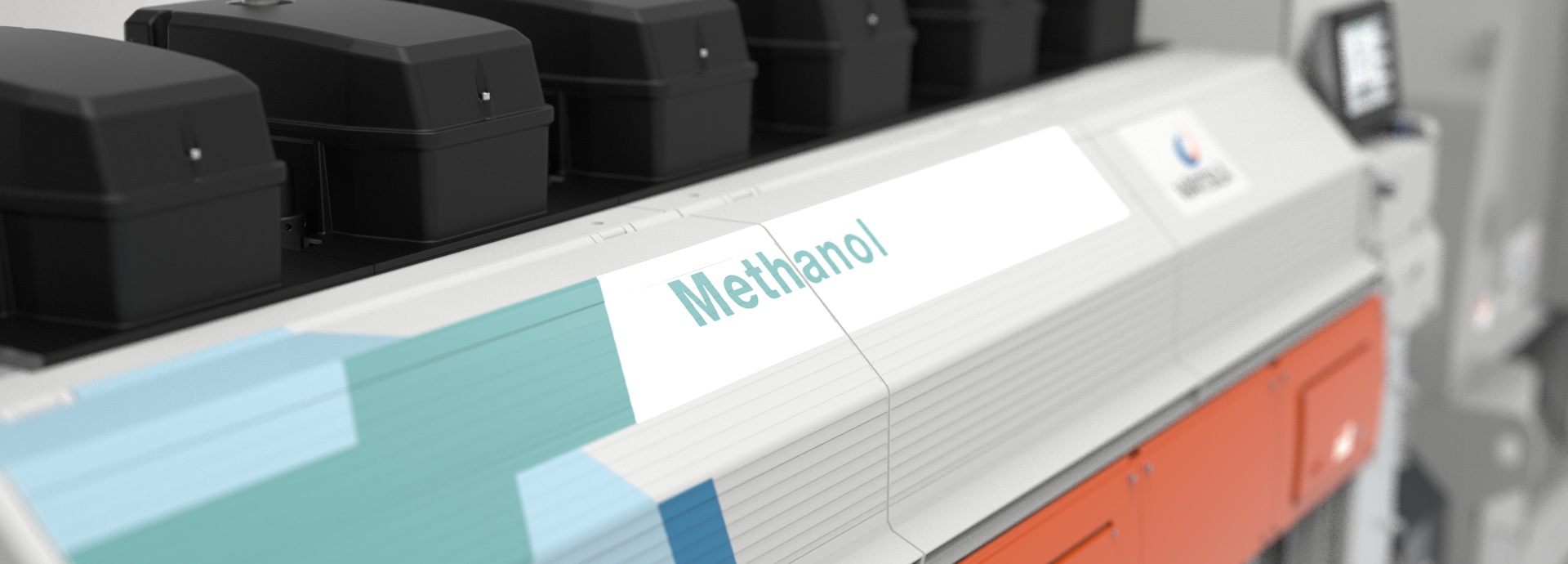
Adopting methanol as marine fuel
If you are considering a switch to low-carbon fuel, methanol is an attractive option. Green methanol has the potential to be carbon free, and it meets current and future emissions targets in terms of NOx, SOx and particulates. This makes methanol as marine fuel an attractive choice for any type of vessel and can help owners and operators on their path to a greener future.
Methanol in shipping – the key facts
Want to know more about methanol as an alternative marine fuel? Discover the key facts on this handy, one-page quick guide.
Why choose methanol as marine fuel?
If you’re currently using diesel, switching to a methanol engine will reduce your emissions. This can significantly improve your EEXI (Energy Efficiency Existing Ship Index) and CII (Carbon Intensity Indicator) ratings.
While the energy transition is in process, vessels are unlikely to be operated on the same fuel for their entire lifecycle. In addition to methanol, there are many other sustainable marine fuels. This page summarises the latest in future fuels development.
If you’re currently using diesel, switching to methanol will reduce CO2 (tank-to-wake) emissions by up to 7%, SOx emissions by up to 99% and NOx emissions by up to 60% compared to heavy fuel oil (HFO) operation. Green methanol, produced using renewable energy, has the potential to be a carbon-free fuel.
Learn more about green methanol and the other methanol “colours”: “Methanol as marine fuel – is it the solution you are looking for?”
Are you a maritime methanol master?
Test your knowledge with our methanol quiz! how well do you know methanol as a marine fuel, are you up for the challenge?
What do you need to think about when planning a methanol-operated vessel?
Choosing between methanol and other decarbonisation solutions depends on both fuel availability in your operating area and which solutions make the most technical and economic sense for your vessel. There are important things to consider, and the following are just the first questions:
- What to expect for OPEX when running on methanol? The price of methanol will have the largest effect on operating expenses. You should consider two things in particular: how much of your vessel’s energy needs will be provided by methanol, and what share of that will be green methanol.
- Will my fuel endurance be impacted? Methanol operation requires roughly twice the volume of fuel as diesel, which is important to consider when planning future operations and bunkering intervals.
- Will there be any changes to load ramps? The load ramp of a methanol engine is similar to that of a diesel engine, but it’s important to consider the physical location of your engine and the piping distance needed from the high-pressure fuel pump.
- Which types of methanol can be used in Wärtsilä engines? Any methanol that meets the engine specifications can be used in a Wärtsilä engine, but obviously renewable methanol is better than fossil-based for environmental reasons.
- Where is methanol available? Methanol is available at over 100 ports around the world, with this number increasing all the time. You can find an interactive map showing ports with available methanol storage capacity worldwide halfway down the Methanol Institute’s Marine page.
How to make your marine fuel conversion a success?
There are five important things to consider when planning a marine fuel conversion. This handy eGuide will help you get started.
The technology for using methanol is already available and proven in the field, with nearly 30 vessels operating on methanol and 138 ordered in 2023, according to DNV. The methanol-operated vessels include conversions with 4-stroke engines and 2-stroke engines that were designed in the newbuild stage to enable methanol operation.
Download white paper
4 clear examples - proof that methanol could really work for your vessel
Discover four real-life examples – one each from the cruise, ferry, merchant and offshore sectors. Learn how operators are already using methanol to solve their challenges, and how you can start using it to reduce emissions immediately.
Choosing a methanol engine for your newbuild vessel
When building a vessel to run on methanol, the vessel design must allow room for fuel storage, equipment, pipes and trunks. Wärtsilä is developing a broad portfolio of methanol engines and the fuel supply systems to help ship owners reduce their greenhouse gas emissions. Wärtsilä is one of the few marine engine builders to have experience with methanol engines and dual-fuel methanol-diesel engines. For example, Wärtsilä was the first to introduce a fuel-flexible large-bore medium-speed 4-stroke engine, which the Stena Germanica ferry has been operating on methanol since the year 2015. The Wärtsilä 32 Methanol engine is currently available for delivery from the factory.
If you’d like to discuss whether a methanol engine might be the right choice for your newbuild project, get in touch for a no-obligation discussion including the facts and figures you need to make your decision.
Choosing methanol for your conversion project
If you’re considering converting an existing vessel to run on methanol, there are many factors to consider. You would either need a methanol engine conversion or replace existing engines with methanol-capable engines such as the Wärtsilä 32 Methanol. In addition, certain auxiliary, safety, and control systems would need to be fitted onboard and methanol tanks would need to be added.
Wärtsilä can assist in initial decision-making by providing:
- an overall concept of vessel conversion
- a calculation of your emissions levels after conversion
- engineering design for vessel integration
We can also supply the key equipment for methanol operation, convert your existing engines to run on methanol or provide new methanol engines.
Want to know more? Simply contact Wärtsilä to discuss your options, or for a full and no-obligation feasibility study.
Take a closer look at methanol solutions
Read more about your options for methanol-fuelled vessels.
Methanol solutions for newbuild vessels
Discover a future-proof methanol-powered system capable of reducing emissions and contributing to maritime decarbonisation. From the engine, through storage and fuel handling to emissions reduction, you can benefit from receiving the whole, fully integrated solution from one supplier.
Before the methanol gets to the engine, Wärtsilä MethanolPac provides a complete fuel supply system including the bunkering station, tank-related equipment, and methanol process equipment as well as the control and monitoring system.
The Wärtsilä 32 engine has been the preferred choice of yards, operators and owners since the 1980s, with more than 5,300 engines delivered to the marine market. The Wärtsilä 32 Methanol builds on this history and pioneers a new era of lower-carbon operations.
When burned as a fuel in a methanol engine, methanol produces 50% less NOx than fuel oil, making the Wärtsilä 32 Methanol engine compliant with IMO Tier II limits. But when combined with selective catalytic reduction such as Wärtsilä’s NOx Reducer (NOR), the engine meets IMO Tier III limits.
Wärtsilä 32 Methanol
The Wärtsilä 32 Methanol engine can run on methanol and/or fuel oils. Because methanol combustion produces 50% less NOx than fuel oil, the Wärtsilä 32 methanol engine is compliant with IMO Tier II limits.
Wärtsilä MethanolPac
A complete fuel supply system for methanol-fuelled ships. It ensures the safe handling of methanol.
Wärtsilä NOx Reducer (NOR)
An emission after-treatment system based on selective catalytic reduction (SCR) technology for nitrogen oxide (NOx) reduction. Add the NOR to your Wärtsilä engine and the combination will meet both IMO Tier III and EPA Tier III regulations.
Methanol conversion for existing vessels
Converting your existing vessel to run on methanol is one way to decarbonise your fleet and improve a vessel’s EEXI and CII ratings. Wärtsilä has been investing in engine conversion technology for over a decade, with engine conversions that have already successfully run on methanol for many years. Each conversion is a complete project starting from initial feasibility studies, design and engineering to engine conversion and installation of related equipment such as tanks, piping and safety systems. Every vessel requires a tailored approach, and Wärtsilä guides you throughout the whole process.
Engine conversion technology is currently available for ZA40S engines and will also soon be available for Wärtsilä 32 and 46F engines.
Wärtsilä 4-stroke methanol conversion
The 4-stroke methanol conversion is a complete solution to retrofit existing vessels to use methanol as fuel. The scope includes engine conversion, fuel handling systems and automation and control systems, and Wärtsilä guides you throughout the process from engineering to implementation.
Training your crew
Since methanol is toxic and flammable, it is crucial to ensure the safety of the crew and the vessel. The Wärtsilä Land and Sea Academy (WLSA) provides high-quality training services. Make sure your personnel are trained to work safely on a methanol-powered vessel.
Insights on methanol as marine fuel
Discover these insightful articles – they will build your knowledge of marine solutions based on the use of methanol.
